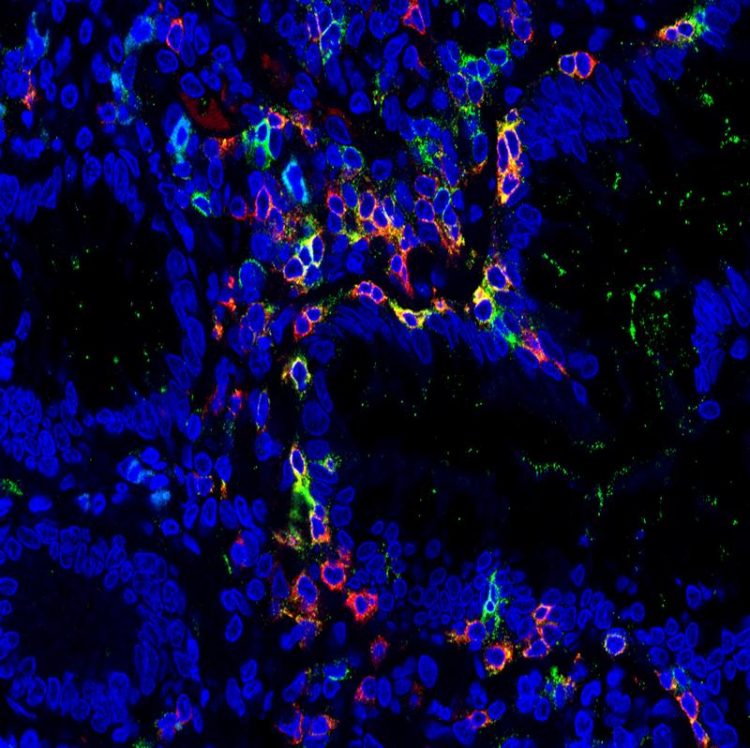Cells that destroy the intestine

FAU researchers have now discovered that so-called TRM cells (shown in yellow) presumably cause flare-ups in chronic inflammatory diseases such as Morbus Crohn or ulcerative colitis. Image: Universitätsklinikum Erlangen/Sebastian Zundler
Chronic inflammatory diseases are caused by a complex mixture of various factors. This leads eventually to the intestine's immune system becoming over-stimulated, with the resulting inflammation often leading to serious symptoms of disease.
The immune system in the intestines includes cells known as tissue resident memory cells, or TRM cells for short. So far, scientists were unaware of the part these cells had to play in causing chronic inflammation in the intestines.
A team of researchers at Universitätsklinikum Erlangen led by Dr. Sebastian Zundler and Prof. Dr. Markus F. Neurath from Department of Medicine 1 at Universitätsklinikum Erlangen – Gastroenterology, Pneumology and Endocrinology have now successfully deciphered these mechanisms.
In cooperation with Sanquin Research Institute in the Netherlands, the researchers were able to prove, for example, that TRM cells have a highly inflammatory potential, and appear to induce flare-ups.
The data also suggest that TRM cells regulate the migration and differentiation of other immune cells and therefore have a central role to play in regulating the immune response. Accordingly, patients with a high proportion of TRM cells in their intestinal lining have a greater risk of suffering from acute inflammatory episodes than those with a lower proportion.
'Until now, no-one realised that TRM cells have a role to play in immunological diseases,' explains Prof. Dr. Markus F. Neurath. 'We believe that our findings are also of relevance for other chronic inflammatory diseases.'
In addition, the researchers hope that their discovery will form the basis for treating diseases in future. 'Future treatments may well be based on the important role TRM cells have to play in the chronic inflammation of the intestine,' predicts Dr. Sebastian Zundler, 'by taking early action, we may be able to suppress the disease or flare-ups of the condition.'
Further information:
Prof. Dr. Markus Neurath
Phone: +49 9131 8535204
markus.neurath@uk-erlangen.de
Media Contact
More Information:
http://www.fau.de/All latest news from the category: Health and Medicine
This subject area encompasses research and studies in the field of human medicine.
Among the wide-ranging list of topics covered here are anesthesiology, anatomy, surgery, human genetics, hygiene and environmental medicine, internal medicine, neurology, pharmacology, physiology, urology and dental medicine.
Newest articles

Economies take off with new airports
A global study by an SUTD researcher in collaboration with scientists from Japan explores the economic benefits of airport investment in emerging economies using nighttime satellite imagery. Be it for…

CAR T–cell immunotherapy targets
Pan-cancer analysis uncovers a new class of promising CAR T–cell immunotherapy targets. Scientists at St. Jude Children’s Research Hospital found 156 potential CAR targets across the brain and solid tumors,…

Stony coral tissue loss disease
… is shifting the ecological balance of Caribbean reefs. The outbreak of a deadly disease called stony coral tissue loss disease is destroying susceptible species of coral in the Caribbean…





















